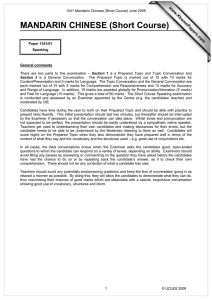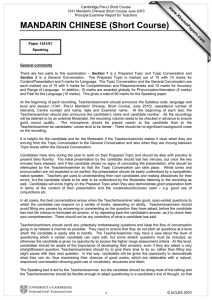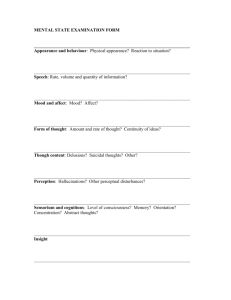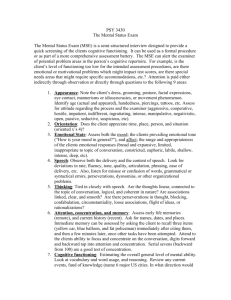www.XtremePapers.com
advertisement
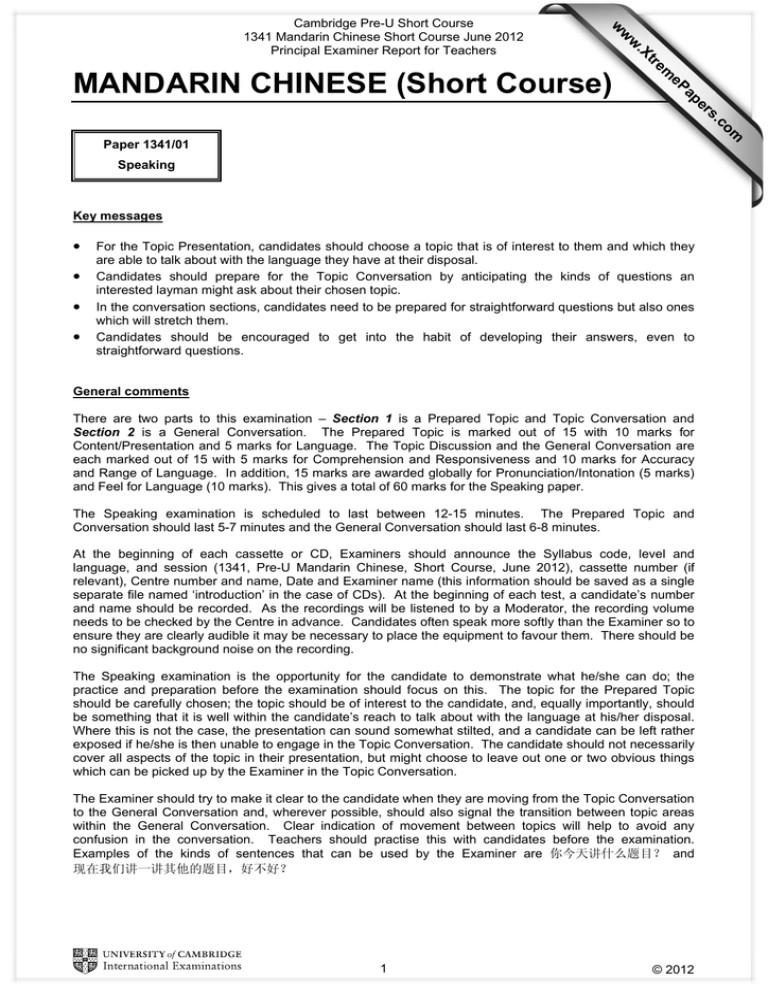
ap eP m e tr .X w MANDARIN CHINESE (Short Course) w w Cambridge Pre-U Short Course 1341 Mandarin Chinese Short Course June 2012 Principal Examiner Report for Teachers om .c s er Paper 1341/01 Speaking Key messages • • • • For the Topic Presentation, candidates should choose a topic that is of interest to them and which they are able to talk about with the language they have at their disposal. Candidates should prepare for the Topic Conversation by anticipating the kinds of questions an interested layman might ask about their chosen topic. In the conversation sections, candidates need to be prepared for straightforward questions but also ones which will stretch them. Candidates should be encouraged to get into the habit of developing their answers, even to straightforward questions. General comments There are two parts to this examination – Section 1 is a Prepared Topic and Topic Conversation and Section 2 is a General Conversation. The Prepared Topic is marked out of 15 with 10 marks for Content/Presentation and 5 marks for Language. The Topic Discussion and the General Conversation are each marked out of 15 with 5 marks for Comprehension and Responsiveness and 10 marks for Accuracy and Range of Language. In addition, 15 marks are awarded globally for Pronunciation/Intonation (5 marks) and Feel for Language (10 marks). This gives a total of 60 marks for the Speaking paper. The Speaking examination is scheduled to last between 12-15 minutes. The Prepared Topic and Conversation should last 5-7 minutes and the General Conversation should last 6-8 minutes. At the beginning of each cassette or CD, Examiners should announce the Syllabus code, level and language, and session (1341, Pre-U Mandarin Chinese, Short Course, June 2012), cassette number (if relevant), Centre number and name, Date and Examiner name (this information should be saved as a single separate file named ‘introduction’ in the case of CDs). At the beginning of each test, a candidate’s number and name should be recorded. As the recordings will be listened to by a Moderator, the recording volume needs to be checked by the Centre in advance. Candidates often speak more softly than the Examiner so to ensure they are clearly audible it may be necessary to place the equipment to favour them. There should be no significant background noise on the recording. The Speaking examination is the opportunity for the candidate to demonstrate what he/she can do; the practice and preparation before the examination should focus on this. The topic for the Prepared Topic should be carefully chosen; the topic should be of interest to the candidate, and, equally importantly, should be something that it is well within the candidate’s reach to talk about with the language at his/her disposal. Where this is not the case, the presentation can sound somewhat stilted, and a candidate can be left rather exposed if he/she is then unable to engage in the Topic Conversation. The candidate should not necessarily cover all aspects of the topic in their presentation, but might choose to leave out one or two obvious things which can be picked up by the Examiner in the Topic Conversation. The Examiner should try to make it clear to the candidate when they are moving from the Topic Conversation to the General Conversation and, wherever possible, should also signal the transition between topic areas within the General Conversation. Clear indication of movement between topics will help to avoid any confusion in the conversation. Teachers should practise this with candidates before the examination. Examples of the kinds of sentences that can be used by the Examiner are 你今天讲什么题目? and 现在我们讲一讲其他的题目,好不好? 1 © 2012 Cambridge Pre-U Short Course 1341 Mandarin Chinese Short Course June 2012 Principal Examiner Report for Teachers Candidates have time during the year to work on their Prepared Topic and with practice should be able to present fairly fluently. This initial presentation should last a maximum of two minutes. If it goes on longer, the Examiner should intervene so that the Topic Conversation can take place. Whilst tones and pronunciation are not expected to be perfect, the presentation should be easily understood by a sympathetic native speaker; candidates should have a good feel for the rhythms and cadences of the language within the sentences. If, for any reason – e.g. nerves/hesitancy – the presentation lasts longer than two minutes, Examiners should not then shorten the Topic Conversation to compensate, as this will reduce the time available to the candidate to demonstrate what they can do and may affect their marks for this part of the test. Short Course Examiners will have become used to understanding their own candidates and making allowances for their errors. Candidates should be reminded that they also need to be understood by the Moderator listening to the recording of their test. It is very natural for the Examiner to want to correct or help the candidate, but this must be avoided. It is also tempting for a Examiner who knows the candidate well to say too much themselves during the examination, by way of response; again this should be avoided. Candidates will score highly on the Prepared Topic when they demonstrate they have prepared well both in terms of the content of what they say and the vocabulary and the structures used – e.g. good use of conjunctions, correct word order and time frames, etc. In all cases, the best conversations ensue when the Examiner asks good, open-ended questions to which the candidate can respond on a variety of levels, depending on ability. Teachers can prepare candidates for this; the Examiner should play the part of the intelligent layman in the Topic Conversation and should be genuinely interested to talk with the candidate about the Prepared Topic. Candidates need to prepare for the Topic Conversation by anticipating and making sure they are ready to answer the kinds of general questions which could be asked by an interested layman. Examiners should avoid asking a series of pre-prepared questions, but should instead listen to the candidate and follow up what he/she says so that a spontaneous and natural conversation develops. Moderators will be listening for a genuine exchange of ideas. For the General Conversation, although sample questions are suggested in the syllabus, it is expected that a majority of questions asked by the Examiner will not be taken directly from this list, though they will be of a similar standard. During their course of study, candidates should be encouraged to develop the vocabulary and linguistic skills to answer a range of questions both on their Topic Presentation and during the General Conversation. In both conversation sections, the Examiner should aim to keep the flow of conversation going in as relaxed a manner as possible. Candidates need to be prepared for straightforward questions, but also ones which will stretch them and Examiners must ensure that they do provide stretching questions, even for weaker candidates, as otherwise they are not being given the opportunity to demonstrate the full extent of what they know. As well as having a conversation, candidates need to regard the examination as an opportunity to show the Examiner what they can do, thus maximising their chances of good marks, which are obtainable with a natural, responsive conversation showing good use of vocabulary, structures and idiom. At this level, candidates should be encouraged to develop their answers, even if they are asked a very straightforward question. Candidates should not worry if they do not understand a question; they should ask for it to be repeated or rephrased (this request should be made in Chinese); if they still do not understand it, the Examiner should try to move swiftly on to another question. The Speaking examination is led by the Examiner, but it is the candidate who should be doing most of the talking and therefore the Examiner will need to be flexible enough to adapt questioning to a candidate’s line of thought, so that a proper conversation can take place. If a candidate has areas of a topic where he/she feels particularly confident, it is up to the candidate to try to respond to questions in such a way as to be able to demonstrate this to the Examiner. Candidates should not worry that their answer to a question is factually untrue or does not really reflect what they think; the Examiner is only interested in the level of their Chinese and should not judge them on their opinions. Cambridge Pre-U Mandarin Chinese is an examination for foreign language learners. Therefore, native speakers of Mandarin who have a well-prepared topic may, in all likelihood, score maximum marks. However, it is the standard required for the foreign language learner which will be borne in mind by the Examiner as the testing and marking of candidates takes place. 2 © 2012 Cambridge Pre-U Short Course 1341 Mandarin Chinese Short Course June 2012 Principal Examiner Report for Teachers MANDARIN CHINESE SHORT COURSE Paper 1341/02 Chinese Culture There were too few candidates for us to be able to produce a meaningful report. 3 © 2012
